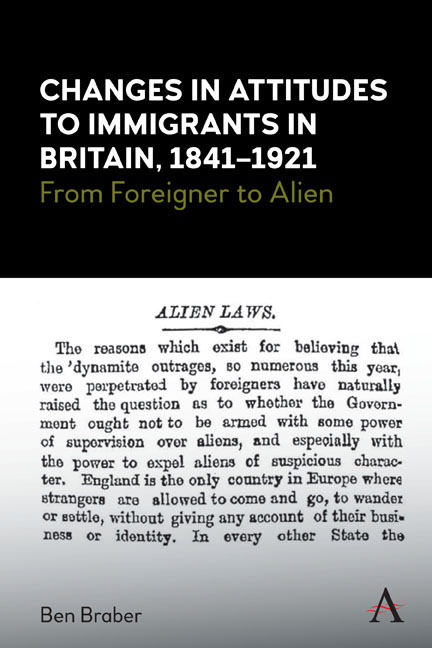2 - Quantitative Analysis of the Use of Alien
Published online by Cambridge University Press: 23 January 2021
Summary
This quantitative analysis examines the changes that occurred in the use of ‘alien’ and the alternatives for this word between 1841 and 1921. For this purpose it reviews five selected newspapers. This review is placed within a context of other publications. At present, there is no single comprehensive searchable corpus of all British English publications for the period under review. For this reason, a choice has been made for a mixture of collections containing census reports, British English books, parliamentary records and pamphlets, and newspapers. This mixture does not give the entire context, but at least it offers a flavour.
Census reports
The census rarely used the word alien before 1921. Since 1841 it recorded birthplaces with a special box for foreign-born people, for example, marked ‘Foreign Parts’ in 1841 and ‘Foreign Countries’ in 1901. The census report of 1851 deviated from this pattern when it commented on the Great Exhibition in London's Crystal Palace attracting many foreigners but listed their number in a table called ‘Aliens and Foreigners Reported by Captains of Ships’. The 1861 report avoided the word alien and mentioned the number of ‘Subjects of Foreign States’ and spoke about ‘foreigners by birth’. In his 1871 report the Registrar General wrote that Britain contained ‘representatives of nearly all the civilized nations, who have voluntarily sought these shores for the sake of trade, or have been driven at various times by persecution to a land which has ever been […] the sacred asylum and the inviolable home of freedom’.
The word alien reappeared in the report on the census of 1901, when it discussed figures of persons born in foreign countries, for example, their geographical distribution across Britain and their occupations. This report, published in 1903, was written by Registrar General William Dunbar, and he related and possibly responded to the meetings or the report of the Royal Commission on Alien Immigration. The census report applied a mixture of terms and phrases, such as ‘aliens’, ‘alien immigrants’, ‘foreign-born’, ‘foreign […] resident’, ‘inhabitants […] born in foreign countries’ and ‘foreigners’. In 1911 the census report returned to omitting the term alien and applying the previously used category of ‘Foreigners’.
- Type
- Chapter
- Information
- Changes in Attitudes to Immigrants in Britain, 1841–1921From Foreigner to Alien, pp. 31 - 46Publisher: Anthem PressPrint publication year: 2020



